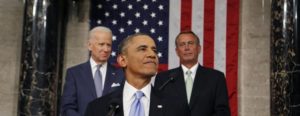
With Republicans in control of the House and adamant about not giving any victories to Obama, the White House budget is seen as a statement of the president’s priorities, rather than a proposal that would have any chance of becoming law.
Even though the proposed budget continues to shrink the deficit in substantive ways—while boosting spending for education and infrastructure—Republicans want no part of it. Obama’s budget projects a $649 billion deficit this year, with the deficit going down each of the next three years to a low of $413 billion in 2018 before rising again. But more impressively, the deficit-to-gross domestic product ratio in the president’s budget would be 3.7 percent this year, dropping to 3.1 percent next year, a level that pleases most experts—particularly considering the ratio was 9.9 percent when President Bush left the White House in 2009.
“The budget is not just about numbers, it’s about our values,” Obama said at a Washington grade school yesterday as he released the budget. “It’s a roadmap for creating jobs” in part through education, while it “adheres to the spending levels” agreed to by Congress, he said.
“As a country, we’ve got to make a decision if we’re going to protect tax breaks for the wealthiest Americans or we’re going to make smart investments necessary to create jobs and grow our economy and expand opportunities for every American,” he said.
But congressional Republicans immediately dismissed Obama’s budget. They will be expected to offer their own budget for the fiscal year beginning Oct. 1 and it will surely include draconian cuts in spending and more tax breaks. At some point, the two sides will be forced to meet somewhere in the middle—or shut down the government once again.
“Folks just aren’t taking it very seriously, because it’s not a very serious document,” said Senate Minority Leader Mitch McConnell, a Kentucky Republican.
Because of an agreement passed by Congress, the budget must limit discretionary spending to 29 percent of the 2015 budget, which is about $1.014 trillion, excluding war funding. The White House says its budget is well below that limit.
HIghlights of the president’s budget include spending of $302 billion over four years on infrastructure projects such as roads and bridges; $60 billion over 10 years to expand the earned income tax credit for childless workers; $66 billion to support preschool programs for all children, paid for with increased taxes on tobacco that the administration said would raise $78 billion over 10 years; making permanent the American Opportunity Tax Credit, benefiting about 11.5 million families and students with an average of more than $1,100 to help pay college costs; $7 billion for disaster relief; $1 billion annually for wildfire suppression, reflecting an increasing fire risk in the West.
Among the tax increases are $598 billion in tax hikes for the wealthy over 10 years, and raising about $100 billion over the next decade through new taxes and restrictions on U.S. multinational companies.


